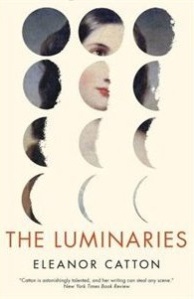 …The Luminaries, Eleanor Catton’s Victorian-style tale of a complicated nineteenth century murder mystery/conspiracy, set in the gold-mining country of western New Zealand. My full review of the 800-plus page novel is here.
…The Luminaries, Eleanor Catton’s Victorian-style tale of a complicated nineteenth century murder mystery/conspiracy, set in the gold-mining country of western New Zealand. My full review of the 800-plus page novel is here.
It is the second major prize win for The Luminaries which copped the Booker Prize last month. Catton’s novel defeated a very strong field in this latest contest:
What Catton’s G-G win has certainly done is put another log on the fire of just what is going on with juries, particularly the Giller, in this year’s Canadian literary prize season. Despite her Booker win, Catton did not even make the Giller longlist — indeed, of the five books on the G-G shortlist only Boyden found any Giller recognition at all — and The Orenda was gone when the shortlist was announced.
The final fuel will be added next week with the Rogers Writers’ Trust winner — neither Catton nor Boyden are on the shortlist, so there will be no new data for either of those titles. Lynn Coady’s Giller-winning story collection, Hellgoing, is there, as is her fellow short-listed colleague, Lisa Moore, for Caught. Those two are joined by Colin McAdam’s A Beautiful Truth from the G-G and two titles that did not make either the Giller or G-G lists: The Eliot Girls, by Krista Bridge and A Bird’s Eye, by Cary Fagan.
I have speculated in comments that the politics of the Penguin/Random House merger and its effect on Canadian publishing could be one explanation for the widely varying lists. All five of the G-G finalists came from Penguin/Random House imprints. Three of the five Giller finalists did — but the surprise winner was from House of Anansi, Canada’s leading independent. Of the Writers’ Trust five, only A Beautiful Truth comes from a Penguin/Random House imprint — perhaps an indication that writers do not think much of the consolidation of Canada’s publishing business.
For what it is worth, as a reader here is what my ranking of the various titles I have read would be: 1. The Orenda 2. The Crooked Maid, by Dan Vyleta 3. The Luminaries. While all three have historical settings, that is about all they have in common — except for being very good books and well worth putting on your Christmas list or considering as a gift for reader friends whom you know.
November 13, 2013 at 10:21 am |
Thanks for your overview. I value the posts and commentaries on this site. I’ve been hesitant to read The Luminaries – perhaps now I will. I’m saving The Orenda for now but can hardly wait to get to it.
LikeLike
November 13, 2013 at 10:25 am |
I certainly recommend them both but, as I indicated in my reviews, both are what I characterize as “slow” reads since each demands some independent thinking from the reader.
LikeLike
November 13, 2013 at 3:00 pm |
Looks like I really ought to read The Luminaries. As ever, too many books, not enough time.
LikeLike
November 13, 2013 at 3:56 pm |
Ha. I was anticipating a comment that asked if The Luminaries was worth the time required for 848 pages and had planned a response — so I’ll give it to you.
If you are the kind of reader who likes to read 20 or 30 pages every night in bed before turning out the light — and don’t mind the prospect of spending six weeks on a single book — this novel would be perfect for you. While the early chapters are very long, they come in bite-sized chunks. And while the story is complex, part of the author’s approach is to examine events from several points of view so, if you have forgotten some details, there is a very good chance they will be revisited.
Alas, I know your reading well enough to know that that hardly describes your approach. On the other hand, it is a New Zealand book, so you may owe it to your heritage to give it a shot.
LikeLike
November 13, 2013 at 7:37 pm |
I’m seeing a lot of positive reviews of this one. I’m still pondering whether or not to read it as I don’t read historical stuff a lot.
LikeLike
November 13, 2013 at 8:25 pm |
Well, you do read Victorian sensation fiction and Trollope, so it may have appeal on that front. The “mystery” of the murder is mainly a plot device to carry the story along — in true Victorian fashion the more interesting series of stories (because there is a host of sub-plots) involve the “cabal” of characters who were involved with the victim, the apparent suicide attempt and the missing man.
LikeLike